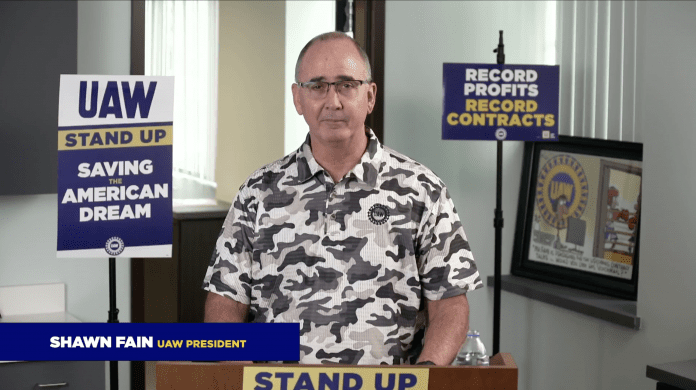The United Auto Workers union on Friday expanded its strike efforts against Detroit-Three automakers to include all 38 parts distribution centers owned by General Motors and Stellantis but spared Ford from additional walkouts.
United Auto Workers president Shawn Fain declared the new wave during a Facebook and YouTube livestream, marking one week since strikes began on September 15. “Today at noon Eastern time, all of the parts distribution employees at General Motors and Stellantis are being called to stand up and strike,” he announced. The move affects 38 additional facilities across 20 states and heavily increases the scope of the union’s strike efforts. The disruption of distribution networks could devastate OEM production in the days ahead, strain new vehicle supplies, impact supplier revenue and result in thousands of layoffs at GM and Stellantis facilities. Fain noted that employee walkouts at three assembly plants launched last week would continue during the new wave of strikes, including those at Ford’s Michigan Assembly Plant.
Earlier in the week, Fain warned Detroit-Three automakers of additional strikes if negotiations failed to make “serious progress” before Friday. During the live stream, the union chief provided status updates on how talks had progressed since this ultimatum. According to Fain, Stellantis and General Motors rejected nearly all UAW counter proposals concerning wage tiers, cost of living adjustments, enhanced profit sharing and benefits for temporary workers. Earlier this month, the union filed labor complaints against both manufacturers, alleging that company executives had used “insulting and counterproductive” tactics throughout contract negotiations. Company executives have since denied the accusations, accusing the organization of mischaracterizing their proposals to the public.
Negotiations with Ford were far more productive in the days leading up to Friday’s announcement. Fain noted the automaker made multiple concessions on key union demands concerning employee pay. United Auto Workers members also won the right to strike over plant closures, a move that could force the company to retool its ICE factories for electric vehicle production rather than opening new facilities in states with anti-union policies. Fain praised Ford for its willingness to compromise on union demands but cautioned viewers that talks were far from over. “To be clear, we’re not done at Ford,” he commented. “We still have serious issues to work through, but we do want to recognize that Ford is serious about reaching a deal.”





